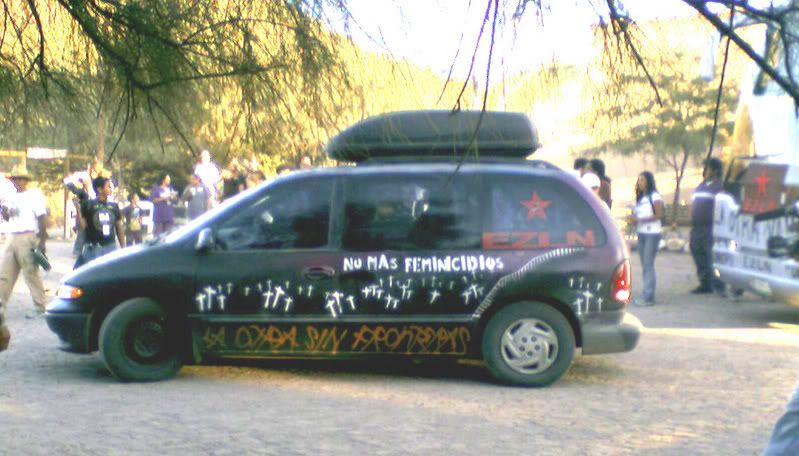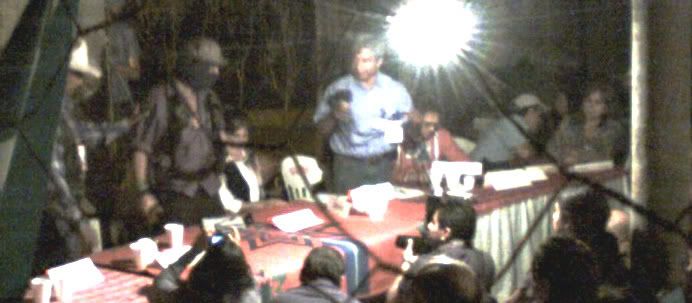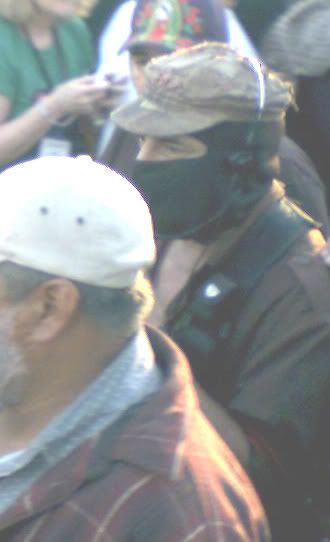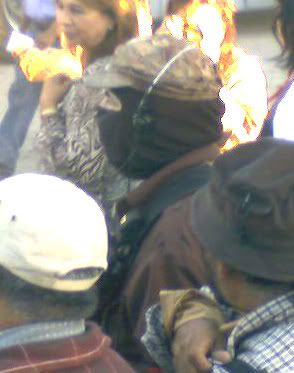GPS and the attack on worker autonomy and unregulated space
 "We've cut the amount of time it takes to do their job by 40 per cent and we are still paying the same rate," says PMP's managing director, Brian Evans. PMP is one of those companies that delivers flyers, paying teenagers and others to walk through neighborhoods putting them on doorknobs.
"We've cut the amount of time it takes to do their job by 40 per cent and we are still paying the same rate," says PMP's managing director, Brian Evans. PMP is one of those companies that delivers flyers, paying teenagers and others to walk through neighborhoods putting them on doorknobs.Because of the nature of the job, it's often hard for bosses to evaluate exactly how much work has been done, and workers routinely reorganize their workload themselves by dumping flyers in the garbage, taking much longer than necessary to complete assigned tasks and deviating from assigned routes for their own purposes. Frequently out of the direct surveillance powers of the boss, the relative autonomy of the job is a bonus from the perspective of the worker and a problem from the point of the view of the boss, perpetual enemy of human freedom that s/he is.
According to the Sydney Morning Herald:
It used to be such a simple job.When PMP introduced this blatant attack on worker autonomy, they anticipated resistance, so they included resignation forms with the informational packet handed out to workers. Several, like the worker above, quit.
The 14-year-old girl would pick up the pamphlets at a warehouse in Artarmon and deliver them around Lane Cove.
Not any more. One Saturday recently she turned up at the warehouse to find that she would have to strap a global positioning system around her waist.
Her employers would be able to track every step she took, ensuring not only that she visited every house she was paid to, but that she followed the route devised by management to save time, and that she did the deliveries within the set time frame. Instead she quit.
By the end of next month every delivery person, or "walker", handing out flyers in Sydney for PMP, the country's largest distributor of unaddressed mail, will be tracked by satellite.
The walker who spoke to the Herald, and who did not want to be named, said she felt as though her employers did not trust her.
"My parents think it's stupid. They think it's bad that a tracking device has to be issued just for delivering pamphlets," she said.
The secretary of Unions NSW, John Robertson, is so angered by the use of GPS to track workers that he has called for the NSW Government to amend the Workplace Surveillance Act to have it outlawed.
"It's outrageous that the first experience a child has of earning a dollar is to be treated like a criminal," he said.
But Evans defended the technology and it's authoritarian impact on workers.
"The professional people who do this job are happy they can now prove they have done a good job," he said.There was no indication that Evans intended to wear a GPS tracker himself. Squeezing more work and more profits, while reducing the individual freedom of workers is a common application of technology in the workplace. One doesn't have to try too hard to imagine bosses also using it to track troublesome workers or to limit their ability to organize collectively to defend their power on the job. Further, the information could be used to track workers - female ones, for instance - for even more nefarious purposes.
Mr Evans said PMP was the first business in the world to use GPS technology in this manner and that it allowed the company to demonstrate to its customers that all their pamphlets were delivered on time.
He said new processes were introduced in tandem with the GPS that included completing and sorting the pamphlets for the walkers.
PMP isn't the only one using GPS at work. Newindpress out of India reports that a police department there has begun tracking its vehicles with GPS.
“We have conducted some trials on a couple of private travel operators and found the system working very effectively,” said an official involved in the R&D.The goal there is not just to control police on the job as workers, but also to augment the class warfare capacity of the department by making the dispatching of police officers quicker and more efficient, thus giving criminals and other enemies of the state less time to escape. A police official involved in the project said, “The GPS would enable us to identify the police vehicle which is closest to the scene of any accident or crime. So we can assign the task quickly." They hope to track 87 vehicles.
As part of the trials, the police fixed a GSM tracking device on a taxi with the permission of the owner, but without the knowledge of the driver. Next day, when the driver came to deposit the vehicle at the office, he was shocked to find the master giving a minute-by-minute account of the just-completed travel assignment.
In Britain, the Ministry of Defence plans to use the technology for both the above purposes.
"Using Masternaut vehicle tracking we know exactly where all our vehicles are at any point in time," said Steve Morgan, Account Manager for Ian Williams. "This has had a significant impact on our service delivery, noticeably reducing 'down time' and therefore improving overall efficiency. There are also benefits for the health and safety of our mobile workforce, as we know the exact location of every team member we can react quickly should the need arise."Here we see a typical argument of the new political environment trotted out: safety. Increasingly, the system and individuals within it at all levels view the lack of direct tracking or absolute knowledge about an environment as the equivalent of dangerous or unsafe. Dark places, unregulated space, where the state or capital's omniscience encounters resistance or limits, have become objects of suspicion and mistrust.
So, it shouldn't surprise us that, while the system is working very hard in its relentless war against unregulated space to expand its level of knowlege about the physical geography of its domain and the movements of the citizens within it, individuals themselves have increasingly begun to demand the expansion of the scope of the unblinking eye of the state and capital.
Along those lines, Cellular-news.com reported that Qualcomm, a leading cell phone manufacturer, announced that
"More than 200 million GPS-enabled handsets have shipped over the past few years, demonstrating that consumers are increasingly demanding location services on the wireless device that most carry with them all the time," said Rob Rovetta, senior director of product management for Qualcomm CDMA Technologies. "Qualcomm's gpsOne technology puts high-performance GPS into handsets, making possible a wide variety of services that make day-to-day activities simpler, safer or more fun for the wireless user."And when a school district in Mumbai, India, installed GPS in all its busses, the reaction from parents was predictable. One parent said, "GPS adds value to the existing school bus system. I feel a lot safer knowing that our kids can be located at any point of time. One can also refer to past files of the bus movement and analyse what went wrong in case there is an accident."
Reflecting another tendency of technology - the transfer of authority off the job floor and into the direct control of managers and their lackey technicians - school principal Meera Isaacs added, "This will greatly enhance security, as we will no longer be dependent on a call from the driver or the attendant in case of an emergency."
The growing insistence on the technology at the top of the hierarchy, combined with the growing consumer demand at the bottom, has created a dialectical vice grip from which it will be difficult to escape. As GPS spreads, human freedom diminishes a little more, illustrating once again the absolute necessity of integrating a deep and radical critique of technology into our revolutionary politics.
If it may have been possible at some point to divide technological innovation from its class warfare implications (a dubious conjecture, however), that is certainly not the case now. Failing to recognize the role of technology with regard to the transitioning nature of power in this ever-more technologized and omniscient world is a major mistake that will surely haunt us as we struggle to overturn the corpse machine before us in hopes establishing any new society rooted in freedom, justice and cooperation.







